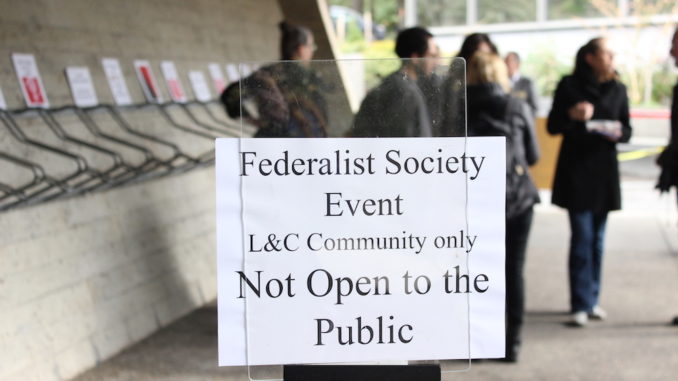
By Hanna Merzbach
In the wake of the protests against Christina Hoff Sommers’ speech at the Lewis & Clark Law School on March 5, several faculty members joined together to create a resolution in favor of the freedom of expression at LC. This document was adapted from a similar statement released by University of Chicago in 2015.
The resolution currently has 13 faculty signatories from a variety of departments. The statement has been sent out to the entire faculty and will move into the adoption process at the faculty meeting on April 3.
After the events at the Law School, Associate Professor of English Lyell Asher helped put the resolution into motion.
“What sparked it for me was the attempt by student protestors to decide for the rest of us what we could and could not hear,” Asher said via email. “The attempt to ‘noplatform’ a speaker is, to my mind, the equivalent of book burning. Preventing someone from delivering a talk is like pulling a book out of my hand.”
According to the drafted resolution, “it is not the proper role of the institution itself to attempt to shield individuals from ideas and opinions they find unwelcome, disagreeable, or even deeply offensive.”
The statement says that members of the community may criticize and contest speakers on campus but may not interfere with the freedom of others to express or hear those views.
Associate Professor of History and Department Chair David Campion, one of the 13 signatories, said the college should have a clear statement about its commitment to free speech.
“It’s always a bit of a balancing act because obviously you can’t say whatever you want and there are guidelines about what’s appropriate given the values of the college, the mission statement and then obviously safety and security issues too,” Campion said. “But, I think we should err more on the side of freedom and free expression because we are an educational institution and that is part of our mission to have robust debates and to have a wide variety of viewpoints.”
The resolution asserts that the college may place narrow restrictions on freedom of expression only when an event or speaker poses genuine threat or harassment may the college restrict this right.
The college has closed events to the public in particular circumstances in the name of student safety, both at the Law School event and the controversial International Affairs Symposium debate last year. According to the statement, “the College may reasonably regulate the time, place and manner of expression to ensure that it does not disrupt the ordinary activities of the institution.”
Events where protesters challenge the freedom of expression are not unique to LC.
“The free and open exchange of ideas is under threat on college campuses,” Asher said via email. “Yale, Middlebury, Claremont, Evergreen State, Reed and many other institutions have experienced it first hand.”
Associate Professor of Political Science and Department Chair Todd Lochner, another one of the signatories, said that his decision to sign the document was more a result of this national trend, as well as his commitment to freedom of expression.
“I don’t want to give the impression that my signing this document is a reaction to the Law School event,” Lochner said. “I wasn’t there. I don’t know anything about the speaker. I do know that students protested and attempted to shut down the speech … But, to my mind, that is not the central thing driving my support for this policy. I just think that it is a useful time, when we look out across college campuses throughout the country, to reflect on what is our commitment to freedom of speech.”
Along with the nature of his political science courses and influence in drafting LC’s hate speech and bias policy, Lochner has long focused on freedom of speech rights at LC.
“As you know Lewis & Clark is not a state school,” Lochner said. “We don’t have to abide by the first amendment. We could ban political speech here if we wanted to. We could shut down the PioLog if we wanted to. One of the things I have always cared about though is making sure LC students have at least the same free speech rights as would students at a public institution like Oregon State or University of Oregon and so that’s kind of always been my focus.”
The professors hope that the resolution will garner more support as it circulates among the faculty and moves into the approval process in April’s faculty meeting, eventually gaining support from the President and the Board of Trustees to move into the implementation phase.
Read the full text of the resolution here.
Additional reporting by Peter Kranitz.
Subscribe to the Mossy Log Newsletter
Stay up to date with the goings-on at Lewis & Clark! Get the top stories or your favorite section delivered to your inbox whenever we release a new issue.

The drafting of this statement on free expression is a positive development. Lets hope that administrators, especially those charged with overseeing the maintenance of diversity and inclusion on campus, will put their names to this resolution.